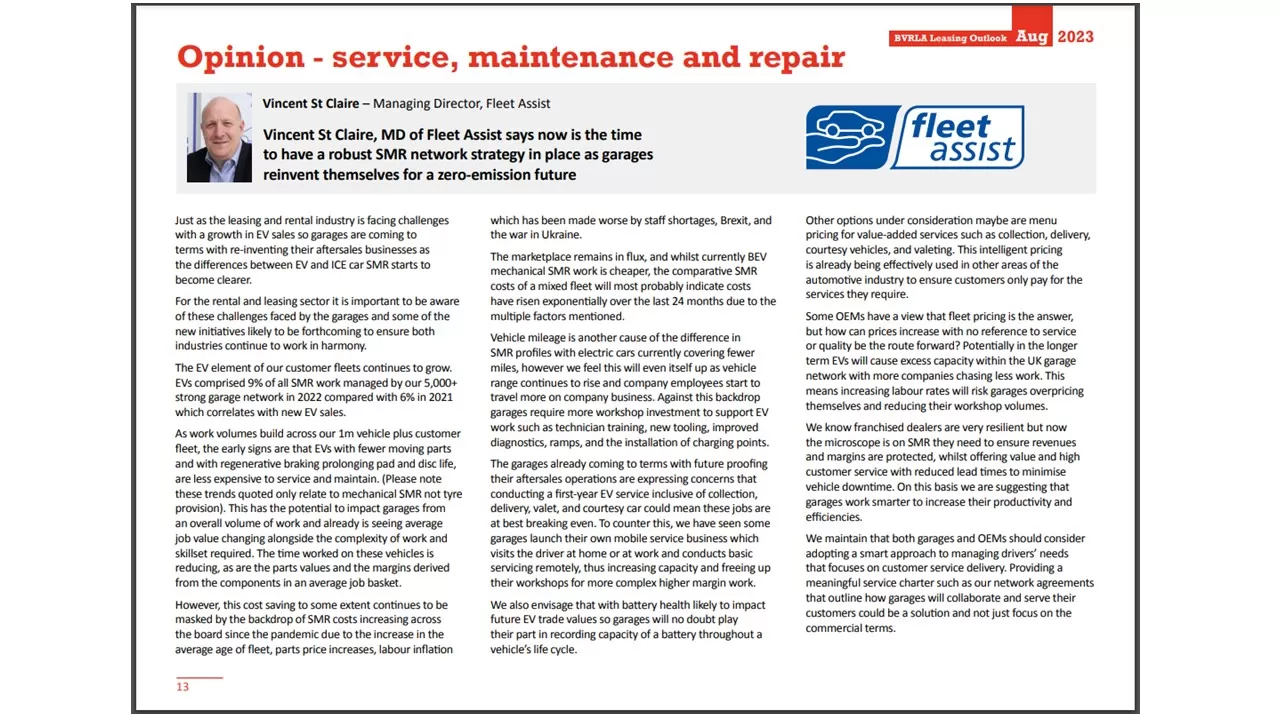 Just as the leasing and rental industry is facing challenges with a growth in EV sales so garages are coming to terms with re-inventing their aftersales businesses as the differences between EV and ICE car SMR starts to become clearer.
Just as the leasing and rental industry is facing challenges with a growth in EV sales so garages are coming to terms with re-inventing their aftersales businesses as the differences between EV and ICE car SMR starts to become clearer.
For the rental and leasing sector it is important to be aware of these challenges faced by the garages and some of the new initiatives likely to be forthcoming to ensure both industries continue to work in harmony.
The EV element of our customer fleets continues to grow. EVs comprised 9% of all SMR work managed by our 5,000+ strong garage network in 2022 compared with 6% in 2021 which correlates with new EV sales.
As work volumes build across our 1m vehicle plus customer fleet, the early signs are that EVs with fewer moving parts and with regenerative braking prolonging pad and disk life, are less expensive to service and maintain. (Please note these trends quoted only relate to mechanical SMR not tyre provision)
This has the potential to impact garages from an overall volume of work and already is seeing average job value changing at the same time the complexity of work and skillset required. The time worked on these vehicles is reducing, as are the parts values and the margins derived from the components in an average job basket.
However, this cost saving to some extent continues to be masked by the backdrop of SMR costs increasing across the board since the pandemic due to the increase in the average age of fleet, parts price increases, labour inflation which has been made worse by staff shortages, Brexit, and the war in Ukraine.
The marketplace remains in flux, and whilst currently BEV mechanical SMR work is cheaper, the comparative SMR costs of a mixed fleet will most probably indicate costs have risen exponentially over the last 24 months due to the multiple factors mentioned.
Vehicle mileage is another cause of the difference in SMR profiles with electric cars currently covering fewer miles, however we feel this will even itself up as vehicle range continues to rise and company employees start to travel more on company business.
Against this backdrop garages require more workshop investment to support EV work such as technician training, new tooling, improved diagnostics, ramps, and the installation of charging points.
The garages already coming to terms with future proofing their aftersales operations are expressing concerns that conducting a first-year EV service inclusive of collection, delivery, valet, and courtesy car could mean these jobs are at best breaking even.
To counter this, we have seen some garages launch their own mobile service business which visits the driver at home or at work and conduct basic servicing remotely, thus increasing capacity and freeing up their workshops for more complex higher margin work.
We also envisage that with battery health likely to impact future EV trade values so garages will no doubt play their part in recording capacity of a battery throughout a vehicle’s life cycle.
Other options under consideration maybe are menu pricing for value-added services such as collection, delivery, courtesy vehicles, and valeting. This intelligent pricing is already being effectively used in other areas of the automotive industry to ensure customers only pay for the services they require.
Some OEMs have a view that fleet pricing is the answer, but how can prices increase with no reference to service or quality be the route forward? Potentially in the longer term EVs will cause excess capacity within the UK garage network with more companies chasing less work which means increasing labour rates will risk overpricing themselves and reducing their workshop volumes.
We maintain that both garages and OEMs should consider adopting a smart approach to managing EV drivers’ needs that focuses on customer service delivery. Providing a meaningful service charter such as our network agreements that outline how garages will collaborate and serve their customers could be a solution.
We know franchised dealers are very resilient but now the microscope is on SMR they need to ensure revenues and margins are protected, whilst offering value and high customer service with reduced lead times to minimise vehicle downtime. On this basis we are suggesting that garages work smarter to increase their productivity and efficiencies and not just focus on labour rates.